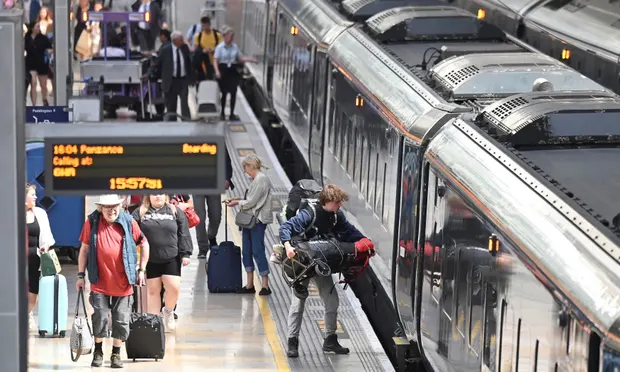More than 20,000 rail workers in England have begun a 24-hour strike that will cancel half of the services on affected lines as part of a long-running dispute with train operators over jobs, pay and conditions.
The stoppage by the National Union of Rail, Maritime and Transport Workers (RMT) – the second of three by rail unions to hit the network this week – will affect most operators in England and some cross-border services into Scotland and Wales.
Then on Saturday more than 12,000 members of Aslef, the train drivers’ union, who went on strike on Wednesday, will carry out another day of industrial action that will leave only 40% of services running.
Rail operators have said services on Friday and Saturday will be severely reduced and have urged passengers to plan their journey before travelling.
The long-running dispute between the operators and the government, and the RMT has shown no sign of abating after the union said it had received clarification in April that the operators’ offer of a 9% pay rise included a stipulation that strikes had to be halted while negotiations into the details of the deal progressed.
In an address to members on the RMT YouTube channel that month, the union’s general secretary, Mick Lynch, argued that a moratorium on strike action would imperil the union’s negotiating position and accused the government of imposing the clause on the operators.
The RMT subsequently received a fresh six-month strike mandate from its members, which passed with an overwhelming 91% majority and a 68% turnout.
Lynch claimed on Friday morning that the cost of the dispute so far adds up to “just shy of £5bn” and blamed the cost on the government, who he said had prevented the train operating companies from settling the dispute with the RMT and Aslef a year ago.
Aslef and the RMT have repeatedly accused the government of preventing the train companies from making an acceptable offer, which the Department for Transport (DfT) denies.
A spokesperson for the Rail Delivery Group, the body representing the rail operators, said: “The upcoming rail strikes called by the Aslef and RMT leadership will not only affect our passengers’ daily commute, but will also impact those travelling to and from the FA Cup final and other events across the country, causing disappointment and frustration for tens of thousands of people.
“It will also inconvenience families who have been looking forward and have planned their half-term holidays. It will also further burden our people who have already lost thousands of pounds at a time of financial strain.
“We understand the impact of these strikes on individuals and businesses alike, and we can only apologise for this unnecessary and damaging disruption.”
A DfT spokesperson said: “Not content with impacting the hundreds of thousands of people who have looked forward to these events all year round, unions are also targeting their own members’ pockets by forcing them to miss out on pay every time they strike.
“The government has facilitated a fair and reasonable pay offer; now union leaders must do the right thing and put this to their members.”



